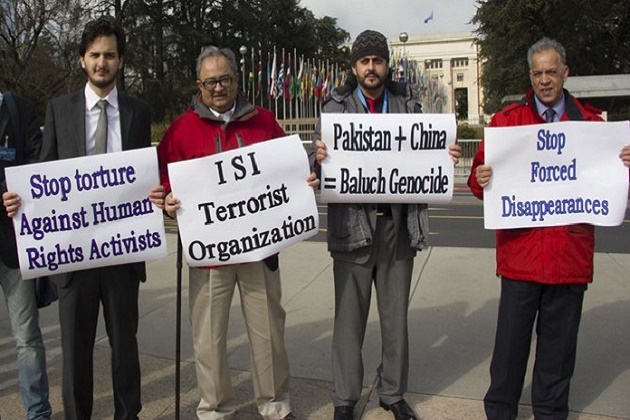Even though United Nations High Commissioner for Human Rights (UNHCR) Michelle Bachelet Jeria’s decision to move the Supreme Court of India on Citizenship Amendment Act (CAA) clearly amounts to interference in a sovereign country’s internal affairs, I would still like to believe that her intentions were entirely honourable. Having said so, I would like thank her for showing concern and request Ms. Jeria to kindly take some time out and also approach the Supreme Court of Pakistan against Protection of Pakistan Act (PPA) 2014 that in the words of Human Rights Watch (HRW) Asia Director Brad Adams “runs roughshod over (human) rights provided under international law as well as Pakistan’s constitution.”
The provisions of PPA are so oppressive and disturbing that in 2014, Adams opined that “Prime Minister Nawaz Sharif, as leader of the House in the National Assembly, should withdraw this resolution and replace it with a law that would fight terrorism while protecting basic rights.” Some of the unnerving provisions of PPA enumerated in the 2014 HRW report are:
- “The vague definition of terrorist acts, which could be used to prosecute a very wide range of conduct far beyond the limits of what can reasonably be considered terrorist activity.”
- “The expansion of powers of arrest without warrant from the police to members of the armed forces or “civil armed forces acting in aid of civil authority” as it “violates the rights against arbitrary arrest under Article 9, and to privacy and the security of the home under article 17 of the International Covenant on Civil and Political Rights (ICCPR).”
- “Shifting the “burden of proof” from government prosecutors to criminal suspects,” which “violates the fundamental principle of presumption of innocence embedded in Article 14 of the ICCPR (that ensures “the right to be presumed innocent until proved guilty according to law).”
- “Providing effective immunity for abuses committed by security forces and judicial officials acting under the law, protecting them from any liability “for acts done in good faith during the performance of their duties.” This blanket immunity violates Article 2(3) of the ICCPR, which requires that governments ensure that any person whose rights or freedoms are violated “shall have an effective remedy, notwithstanding that the violation has been committed by persons acting in an official capacity.”
- Empowering the government to determine the place of custody, inquiry, investigation and trial. This could permit detentions and prosecutions being conducted outside the established judicial system in violation of basic protections against arbitrary detention under Article 9 of the ICCPR and the right to “a fair and public hearing” under Article 14.
Certain other draconian provisions of the Protection of Pakistan Act (PPA) 2014 , on which International Commission of Jurists (ICJ) have expressed grave concern are:
- Section 6, which permits preventive administrative detention without adequate safeguards and retrospectively authorises otherwise arbitrary or unauthorised arrests or detentions previously carried out, in violation of the right to liberty.
- Section 9, which among other things, authorizes secret and unacknowledged detention, as well as in some cases, the nondisclosure of grounds for detention.
- Section 3(2)(c), which allows arbitrary interference with the right to privacy.
- Vague and over broad offences, defined in the Schedule to the Act, including Section 1(xiv) relating to cyber-crimes, internet offences and other offences related to information technology that “threaten the security of Pakistan,” which are open to abuse and could lead to the stifling of peaceful expression of political dissent.
- Sections 15 and 5(5), which reverse the burden of proof in criminal proceedings in contravention of the presumption of innocence, a fundamental requirement for fair criminal proceedings, applicable to all accused persons no matter how heinous the crime with which they are charged.
- Sections 8, 10, 17(2), and 17(3), which establish Special Courts and set out procedures for the operation of Special Courts that would expand the scope of secret hearings and do not meet human rights requirements for fair and public criminal proceedings before a competent, independent and impartial tribunal.
What should be of particular concern to Ms. Jeria is that even though
Human Rights Watch (HRW) and International Commission of Jurists (ICJ) are autonomous bodies and independent of each other, the reservations expressed on Protection of Pakistan Act (PPA) 2014 by the Asia Directors of both these organisations are strikingly similar and pertain to Pakistan’s extremely poor record of human rights record. While HRW’s Asia Director Brad Adams has highlighted that “Pakistan has a long history of abuses of suspects in detention and should reject this vague and over-broad counter-terrorism law.” Sam Zarifi, who’s ICJ’s Asia Director maintains that “This law is more like a license for the Government (Pakistan) to continue its poor record of enforced disappearances, extrajudicial executions, torture and ill-treatment, and arbitrary detentions—all gross violations of human rights that are already committed at horrific levels in Pakistan.”
Tailpiece: By approaching the Supreme Court of India on the CAA issue, the United Nations High Commissioner for Human Rights has set a precedent and to prove that she isn’t parochial, Ms. Jeria is morally bound to show a similar concern for all those who have been stripped off their dignity and denied basic rights by the draconian provisions of PPA 2014!


India pak should learn from us Canada. Stop blowing billions on imported arms to fight your neighbor. Peace free trade and free movement is better than hot air and bluster. Grow up
I fully concur with the writer. Glad to read such a piece.
UNO & its affiliated organisations namely WHO & UNHCR have lately gone to dogs, WHO chief exhorted other countries to continue trade and travel to China when CORONA was spreading. Now this UNHCR chief is acting as if she rules the World , we are waiting to see when she will restore human rights in China, Pakistan and Saudi Arabia.